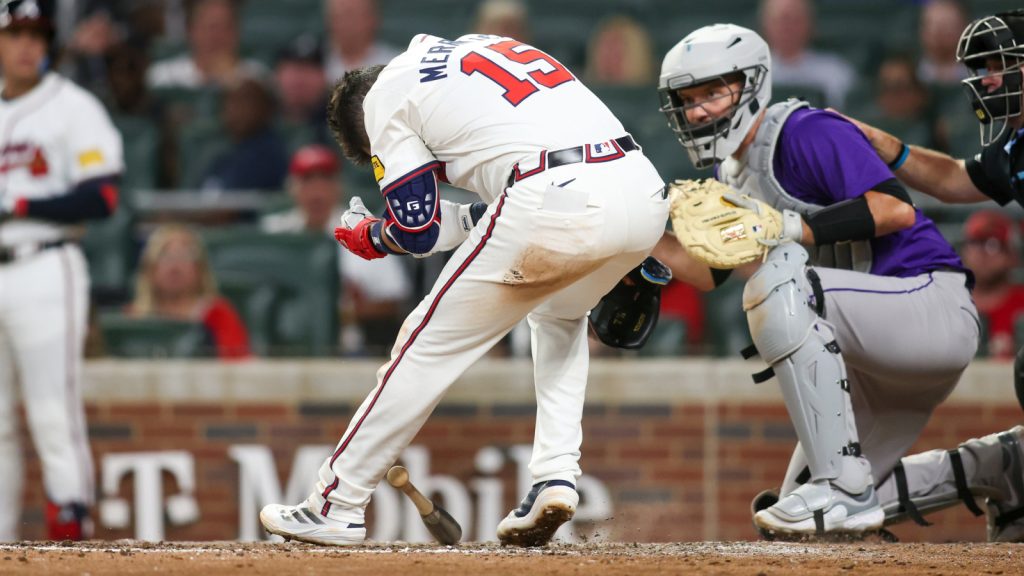Whit Merrifield has had enough. The Atlanta Braves second baseman was hit in the head Tuesday night by a 94.5 mph Jeff Criswell pitch in the seventh inning of the Braves’ 3-0 win over the Colorado Rockies. Merrifield was visibly angry after the incident, shouting at Criswell while being attended to and as he was walking off the field. The veteran passed concussion protocol, but vented postgame about the dangers of modern pitching.
“No repercussion on [Criswell’s] part, and I mean, without being overly dramatic, that was my life on the line right there,” Merrifield said, according to a report from The Athletic’s David O’Brien. “So, I’m sick of it, it’s happening way too much. I watched Taylor Ward get hit in the face last year and have to get reconstructive surgery. Justin Turner got hit in the face last year. It’s happening at an exponential rate. Guys are getting hit in the hand, Mookie Betts broke a bone in his hand this year. It’s just ridiculous, and it has to be fixed. Or, God forbid, something terrible’s going to happen.”
Pitchers are throwing harder than ever and they’re doing it more consistently than ever. Sports Illustrated’s Tom Verducci detailed the rise of velocity in 2023 as pitches in the triple-digits jumped from 1,056 in 2019 to 3,348 in 2022. On Tuesday, Ben Joyce of the Los Angeles Angels threw a 105.5 mph pitch for a strikeout, the fastest strikeout pitch since MLB started tracking pitch velocity in 2008.
As velocity has increased, there have been plenty of studies about the toll it takes on a pitcher’s arm. But what is the effect on hitters? Merrifield, who is a member of the league’s Competition Committee, lamented the fact that Criswell will move on unscathed. He continued to pitch in the game and he will never have an at-bat in which he could be retaliated against.
In that way, the game used to police itself to a certain degree because pitchers had to step into the batter’s box. Hit somebody with a fastball? Prepare for 95 mph straight to the back the next plate appearance. That’s a thing of the past, now, as the designated hitter has taken over in both of the American and National League.
From one angle, this is part of the game. Hitters know the realities of stepping into the box. Over the years, they’ve armored themselves up with an increasing amount of elbow and arm guards. From another angle, though, pitchers are employed to get batters out and a mistake in accuracy can be costly — even potentially fatal. To Merrifield, modern-day pitchers have sacrificed accuracy for a bigger number on the radar gun, endangering both themselves and the hitters they face.
It will be interesting to see how the next few months play out as Merrifield undoubtedly brings the issue to the Competition Committee. Pitchers who hit a batter in the head should be punished. As with football’s targeting rules, a pitcher should be ejected from the game and suspended for one game. There has to be some sort of consequence for missing that poorly with a pitch.
There will be arguments that such a rule would be unfair, that the pitcher needs the inner half of the plate. It’s true that they do and they’re free to still use the inner half. They’re even free to come inside a little more to brush a hitter back. But there has to be a line somewhere.
Should the league choose to keep going as it is then Merrifield is right: something terrible is going to happen.

